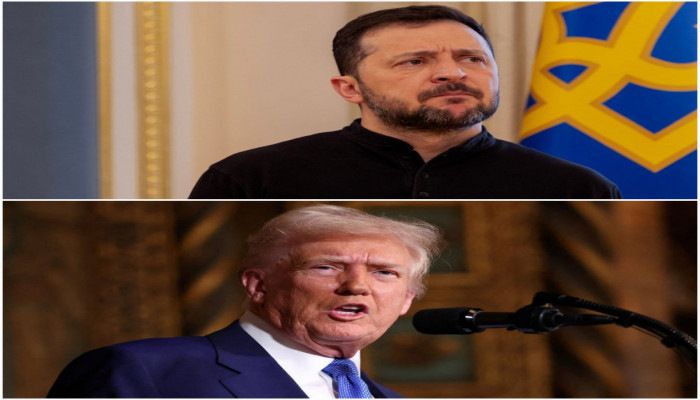Trump calls Zelensky a ‘dictator without elections’ and warns to ‘move fast’
- In Reports
- 02:12 PM, Feb 20, 2025
- Myind Staff
As tensions escalate between U.S. President Donald Trump and Ukrainian President Volodymyr Zelensky over the Russia-Ukraine war, Trump launched a sharp attack on Zelensky, calling him a "dictator without elections" and warning him to "move fast."
This came just hours after Zelensky accused Trump of being caught in a "disinformation bubble" earlier on Wednesday and claimed there were efforts to remove him from power.
"He refuses to have Elections, is very low in Ukrainian Polls, and the only thing he was good at was playing Biden “like a fiddle.” A Dictator without Elections, Zelensky better move fast, or he is not going to have a Country left," Trump’s post on social media noted. In February 2022, Russia’s invasion of Ukraine caused a delayed election, which was scheduled for April 2024.
The leaders are engaged in a tense exchange after US-Russia talks in Riyadh on Tuesday, which focused on ending the Russia-Ukraine war. Zelensky has rejected the meeting’s outcome, criticising the fact that Ukraine was not included in the discussions.
“Think of it: a modestly successful comedian, Volodymyr Zelensky, talked the United States of America into spending $350 billion dollars to go into a war that couldn’t be won, that never had to start, but a war that he, without the US and “TRUMP,” will never be able to settle,” Trump slammed Zelensky saying this remarks as he was a television star previously, before becoming a President.
Trump's social media post shows, "Zelenskyy probably wants to keep the “gravy train” going. I love Ukraine, but Zelenskyy has done a terrible job, his country is shattered, and MILLIONS have unnecessarily died – And so it continues".
Before, Zelensky criticised Trump, accusing him of being caught in a Russian "disinformation bubble" and insisting that any attempts to remove him during the ongoing conflict with Russia would not succeed. His remarks responded to Trump’s claim that Zelensky’s approval ratings were falling.
Trump stated that Zelensky’s approval rating was only four per cent, but the latest poll showed it to be 57 per cent.
Rejecting Trump’s claims, Zelensky reiterated on Wednesday that the Republican leader is trapped in a Russian-driven disinformation campaign against him.
“If someone wants to replace me right now, it won’t work. The statements about his approval rating at 4 per cent are Russian disinformation. Trump is trapped in this disinformation bubble," Zelensky informed Ukrainian TV.
Zelensky stated that he “would like Trump’s team to have more truth about Ukraine,” emphasising that no one in Ukraine trusts Russian President Vladimir Putin. He also asserted that Ukraine’s army remains resilient and that most Ukrainians would not support benefits to Russia.
In a breakthrough, US Secretary of State Marco Rubio and Russian Foreign Minister Sergei Lavrov held a meeting in Saudi Arabia's capital on Tuesday. The two leaders agreed to work on strengthening bilateral ties between their countries, which have been at an all-time low. A significant step towards healing the rift, they've committed to collaborating on ending the ongoing Ukraine-Russia conflict.
As soon as the meeting’s outcome was made public, Zelensky declared that no one could "decide anything behind our backs" and postponed his trip to Saudi Arabia to avoid giving "legitimacy" to the Riyadh meeting.
"We want no one to decide anything behind our backs... No decision can be made without Ukraine on how to end the war in Ukraine," he stated, then further said, "We were not invited to this meeting; it was a surprise for us". He wanted Turkey and Europe’s involvement in the talks.
The US President criticised this position, accusing his Ukrainian counterpart of "starting" the war. Trump called Zelensky a "grossly incompetent" leader and a weak negotiator, stating that he should have created a deal to finish the dispute with Russia almost three years ago.
Washington and Moscow have each assigned high-level teams to work on resolving the war, which started in February 2014 and increased mainly in February 2022 when Russia undertook a full-scale charge of Ukraine.







Comments